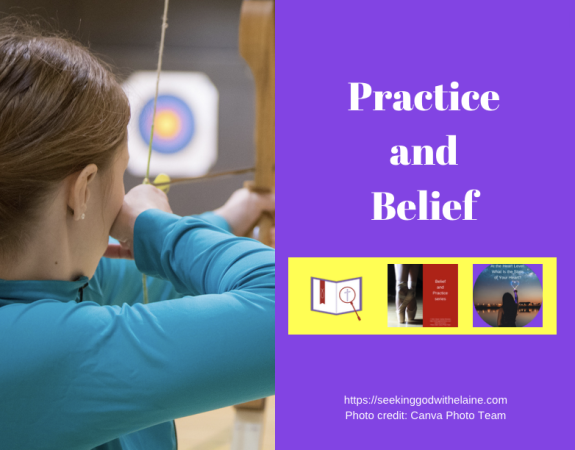We always say that we want to put our belief into practice. This daily devotional looks at why that can be hard to do.
Nuggets
- Belief does not necessarily make practice easier.
Devotions in the Belief and Practice series

In the previous devotion, we started looking at how Waterland fleshed out belief and practice in his Dependence on Our Inward Frame. We got through belief.
Now, we are going to take a look at practice.
Resource
Let's Put It into Context
Here is a running list of nuggets for the series.
The Issues of Practice
“For I do not understand my own actions. For I do not do what I want, but I do the very thing I hate. Now if I do what I do not want, I agree with the law, that it is good. So now it is no longer I who do it, but sin that dwells within me. For I know that nothing good dwells in me, that is, in my flesh. For I have the desire to do what is right, but not the ability to carry it out. For I do not do the good I want, but the evil I do not want is what I keep on doing. Now if I do what I do not want, it is no longer I who do it, but sin that dwells within me” (Rom. 7: 15-20 ESV)
Belief does not necessarily make practice easier.
It is easy to say that, after we become disciples, our hearts should have a God-approved status. That isn’t always the case.
Look at what Paul said in Romans 7: 15-20. He wanted to walk the straight and narrow, but he didn’t.
Yes, the Energizer Bunny for God still sinned after his Hollywood splash conversion.
If there was anyone who didn’t sin after conversion, consensus would probably say it would be Paul. But he is human, too. He could sin, and he did.
Why do believers still sin after conversion? Well, we get into a situation and are ruled by our passions. Our principles don’t mean a hill of beans.
Principles may slow us down some. But we are very good at steamrolling right on over them.
Part of the reason why we may think we shouldn’t keep on sinning is because we now have knowledge of what sin is. We want to take the worldview standpoint and trust on knowledge.
Too many times, we know what is right, but do what is wrong anyway. Waterland gave a good description of knowing-right-doing-wrong looks like. He wrote,
“When some sensible good is presented to the eye or to the mind the man judges it to be agreeable or pleasant to the sense, and so far judges right. Yet this alone would not determine his choice, because other considerations, more weighty, might keep him from it. But he dwells upon the thought till his heart is inflamed: then he chooses, and not till then. The drift and bent of his soul leaning too much toward it, he cuts off all farther consideration, and is precipitately determined by it. It is the desire, the impatience, the passion of his heart that hurries him into it. Men act against principle, driven on by a prevailing passion.”
Resource
Knowledge is totally different than grace. Grace is a free and unmerited gift of love from the Heavenly Father, given through His Son, Jesus Christ, that enables salvation and spiritual healing to believers by the work of the Holy Spirit.
Knowledge is just head knowledge. It doesn’t necessarily get a change to the heart level.
Why can’t we trust knowledge and common sense? It doesn’t take into account the status of our hearts. Waterland wrote, “But our irregular actions seem rather ultimately resolvable into the false judgments which we make [them] into affection or inclination; the head is first tainted, then the heart.”
Resource
We can’t rely solely on worldly knowledge. It isn’t going to lead us to God. It is going to try to get us to rely on ourselves.
Also, Waterland cautioned that the head is corrupted before the heart. Our practices still come from the amoral condition of the heart.
When we rely on grace, we acknowledge that it isn’t anything we do or don’t do that brings us salvation. It is all about God and what Jesus has already done for us.

Making the Connections
Let’s go back to the knowing-right-doing-wrong concept. Why do we not follow our principles? Waterland gave us three reasons.
- We don’t consider what they are.
- We disregard them.
- We don’t apply them consistently.
Resource
How Do We Apply This?
- We have to stand by our principles.
- We have to make them a part of our everyday living.
- We have to evaluate our principles to determine if they are good or bad.
- When we have bad principles, we have to change them to what God wants us to have.
- We have to take our focus off the world and put it on God.
Father God. So many times, we think it will be easy after conversion. We think we will immediately be perfect like You – and we aren’t. Help us navigate the Sanctification Road so that we do become more like You. May we hear “welcome home, my faithful servant” when we reach Your throne. Amen.
What do you think?
Leave me a comment below (about this or anything else) or head over to my Facebook group for some interactive discussion.
If you don’t understand something and would like further clarification, please contact me.
If you have not signed up for the email daily or weekly providing the link to the devotions and the newsletter, do so below.
If God has used this devotion to speak with you, consider sharing it on social media.